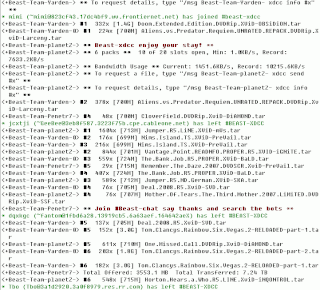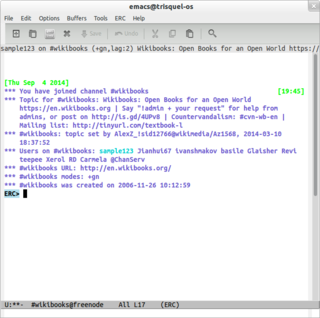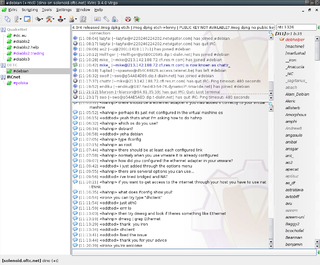
IRC is a text-based chat system for instant messaging. IRC is designed for group communication in discussion forums, called channels, but also allows one-on-one communication via private messages as well as chat and data transfer, including file sharing.

ChatZilla is an IRC client that is part of SeaMonkey. It was previously an extension for Mozilla-based browsers such as Firefox, introduced in 2000. It is cross-platform open source software which has been noted for its consistent appearance across platforms, CSS appearance customization and scripting.

XDCC is a computer file sharing method which uses the Internet Relay Chat (IRC) network as a host service.

Visual IRC (ViRC) is an open-source Internet Relay Chat client for the Windows operating system. Unlike many other IRC clients, nearly all of the functionality in ViRC is driven by the included IRC script, with the result that the program's behavior can be extended or changed without altering the source code.

The mIRC scripting language is the scripting language embedded in mIRC and Adiirc, IRC clients for Windows but work with WiNE for Linux.
IRC services is a set of features implemented on many Internet Relay Chat networks. Services are automated bots with special status which are generally used to provide users with access with certain privileges and protection. They usually implement some sort of login system so that only people on the access control list can obtain these services.

A botnet is a group of Internet-connected devices, each of which runs one or more bots. Botnets can be used to perform distributed denial-of-service (DDoS) attacks, steal data, send spam, and allow the attacker to access the device and its connection. The owner can control the botnet using command and control (C&C) software. The word "botnet" is a portmanteau of the words "robot" and "network". The term is usually used with a negative or malicious connotation.
An IRC bot is a set of scripts or an independent program that connects to Internet Relay Chat as a client, and so appears to other IRC users as another user. An IRC bot differs from a regular client in that instead of providing interactive access to IRC for a human user, it performs automated functions.
An IRCd, short for Internet Relay Chat daemon, is server software that implements the IRC protocol, enabling people to talk to each other via the Internet. It is distinct from an IRC bot that connects outbound to an IRC channel.
Client-to-client protocol (CTCP) is a special type of communication between Internet Relay Chat (IRC) clients.

ERC is an Internet Relay Chat (IRC) client integrated into GNU Emacs. It is written in Emacs Lisp.
Internet Relay Chat Flooding/Scrolling on an IRC network is a method of disconnecting users from an IRC server, exhausting bandwidth which causes network latency ('lag'), or just disrupting users. Floods can either be done by scripts or by external programs.
An Internet bot, web robot, robot or simply bot, is a software application that runs automated tasks (scripts) on the Internet, usually with the intent to imitate human activity, such as messaging, on a large scale. An Internet bot plays the client role in a client–server model whereas the server role is usually played by web servers. Internet bots are able to perform simple and repetitive tasks much faster than a person could ever do. The most extensive use of bots is for web crawling, in which an automated script fetches, analyzes and files information from web servers. More than half of all web traffic is generated by bots.
The following tables compare general and technical information between a number of notable IRC client programs which have been discussed in independent, reliable prior published sources.
MSN Chat was the Microsoft Network version of IRCX, which replaced Microsoft Chat, a set of Exchange-based IRCX servers first available in the Microsoft Comic Chat client, although Comic Chat was not required to connect.

Mibbit is a web-based client for web browsers that supports Internet Relay Chat (IRC), Yahoo! Messenger, and Twitter. It is developed by Jimmy Moore and is designed around the Ajax model with a user interface written in JavaScript. It is the IRC application setup by default on Firefox.

Konversation is an Internet Relay Chat (IRC) client built on the KDE Platform and is free software released under the terms of the GNU GPL-2.0-or-later. Konversation is currently maintained in the KDE Extragear Network module, which means that it has its own release cycle which is independent from the main KDE applications. It is the default IRC client in many prominent Linux distributions, such as openSUSE, the KDE spin of Fedora, and Kubuntu.

KVIrc is a graphical IRC client for Linux, Unix, Mac OS and Windows. The name is an acronym of K Visual IRC in which the K stands for a dependency to KDE, which became optional from version 2.0.0. The software is based on the Qt framework and its code is released under a modified GNU General Public License.

Quassel IRC, or Quassel, is a graphical, distributed, cross-platform IRC client, introduced in 2008. It is released under the GNU General Public License version 2 and version 3, for GNU and Unix-like operating systems, macOS, and Microsoft Windows. It has also been ported to OS/2 Warp due to its cross-platform nature. Since the release of Kubuntu 9.04 Quassel is Kubuntu's default IRC client. Quassel uses the Qt application framework.










